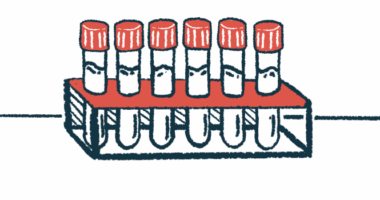Repurposed vet drug helps ALS patients live longer: Study
NUZ-001 slows disease progression in extension trial

A veterinary medication repurposed as a treatment for amyotrophic lateral sclerosis (ALS) helped patients live longer and slowed disease progression in a long-term clinical trial.
The drug, NUZ-001 from Neurizon Therapeutics, was generally safe and well tolerated in the open-label extension (NCT06177431) study, which tested the treatment in adults who continued taking it after a dose-finding Phase 1 clinical study, MEND (NCT04894240). Some participants took the medication for more than 2.5 years.
The results “reinforce the potential of NUZ-001 to deliver meaningful clinical benefits for people living with ALS,” Michael Thurn, PhD, managing director and CEO of Neurizon, said in a company press release.
The findings support the rationale for testing NUZ-001 in the pivotal HEALEY ALS platform trial, led by researchers at Massachusetts General Hospital in Boston. That trial is testing multiple candidate treatments simultaneously to shorten development timelines. The NUZ-001 Phase 2/3 arm is expected to start later this year, pending the clearance of a clinical hold by the U.S. Food and Drug Administration in the next few months.
NUZ-001 contains monepantel, which is usually used to treat worms in livestock. But it has an off-target effect: It blocks the mTOR signaling pathway, which regulates a cellular process called autophagy through which unneeded or damaged components are broken down and recycled.
Blocking protein buildup could slow ALS progression
The recycling system is faulty in ALS patients, causing incorrectly folded proteins to build up in motor neurons — the nerve cells that control voluntary movements — to gradually die off. Because NUZ-001 has the potential to reduce abnormal protein buildup, it could help slow ALS progression.
The MEND study tested that idea. Twelve adult ALS patients received either a high or a low dose of NUZ-001 for 28 days, after which all patients continued treatment through a compassionate use program. They were then given the option to join an open-label extension, in which all received daily NUZ-001 at the optimal 10 mg/kg dose for up to a year.
Ten of the initial 12 participants joined the open-label extension. After one year of treatment with NUZ-001, their average rate of functional decline — measured using the ALS Functional Rating Scale-Revised (ALSFRS-R) — was 0.88 points per month. This was comparable to the 0.74 point-per-month decline seen in the MEND study, suggesting that NUZ-001 may have stable, durable benefits.
Other benefits observed in MEND were also sustained through the open-label extension. Lung function decreased gradually from 72.4% to 62.3%, which was not significantly worse than in the MEND study, suggesting stable preservation of lung function.
Quality of life and cognitive skills also remained stable, while biomarkers of nerve damage — neurofilament light chain in blood and p75ECD in urine — held steady or decreased.
“For too long, patients and families have faced this devastating disease with very few treatment options, and the field has struggled to find truly viable new options,” Thurn said. “To see sustained functional and respiratory benefits, a clear survival advantage, and supportive biomarker trends after nearly three years of treatment gives us additional confidence.”
The researchers compared the data with matched historical controls from the PRO-ACT historical database, the largest publicly available dataset, which includes data from thousands of patients who participated in ALS clinical studies. Results showed that patients treated with NUZ-001 through MEND and the extension had a 76.7% lower risk of death and survived for about 16 months, or almost 1.5 years, longer.
Compared with the historical controls, participants who received NUZ-001 had a 31% slower functional decline, as measured with the ALSFRS-R, and their lung function declined 43% more slowly.
“It has been a pleasure to be part of the development of NUZ-001 as a potential drug treatment for people living with ALS,” said principal investigator Susan Mathers, PhD, associate professor at Calvary Health Care Bethlehem in Australia. “NUZ-001 has been a well-tolerated therapy and we hope that the future phase 2/3 study will confirm its potential to benefit the wider ALS community.”






